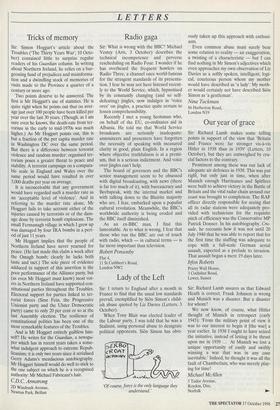LETTERS Tricks of memory
Sir: Simon Hoggart's article about the Troubles (The Thirty Years War', 10 Octo- ber) contained little to surprise regular readers of his Guardian column. In writing about Northern Ireland, he relies on a bur- geoning fund of prejudices and misinforma- tion and a dwindling stock of memories of visits made to the Province a quarter of a century or more ago.
Two points deserve to be answered. The first is Mr Hoggart's use of statistics. He is quite right when he points out that on aver- age just over 100 people have been killed per year over the last 30 years. (Though, as I am sure even he knows, the death-rate from ter- rorism in the early to mid-1970s was much higher.) As Mr Hoggart points out, this is but a fraction of the per capita murder rate in Washington DC over the same period. But there is a difference between terrorist violence and random murder: organised ter- rorism poses a greater threat to peace and stability. A terrorist campaign on a compara- ble scale in England and Wales over the same period would have resulted in over 3,000 deaths per year on average.
It is inconceivable that any government would have regarded such a murder rate as an 'acceptable level of violence'. And in referring to the murder rate alone, Mr Hoggart fails to take account either of the injuries caused by terrorists or of the dam- age done by terrorist bomb explosions. The small Fermanagh village in which I grew up was damaged by four IRA bombs in a peri- od of just 11 years.
Mr Hoggart implies that the people of Northern Ireland have never yearned for peace. (He last made this claim a week after the Omagh bomb; clearly he lacks both taste and tact.) The sole piece of evidence adduced in support of this assertion is the poor performance of the Alliance party, but (as even Mr Hoggart must know) most vot- ers in Northern Ireland have supported con- stitutional parties throughout the Troubles. Electoral support for parties linked to ter- rorist forces (Sinn Fein, the Progressive Unionist party and the Ulster Democratic party) came to only 20 per cent or so at the last Assembly election. The resilience of constitutional politics has been one of the most remarkable features of the Troubles.
And is Mr Hoggart entirely guiltless him- self? He writes for the Guardian, a newspa- per which has in recent years taken a some- what indulgent approach to extreme Repub- licanism; it is only two years since it serialised Gerry Adams's mendacious autobiography. Mr Hoggart himself would do well to stick to the one subject on which he is a recognised authority: Mr Michael Fabricant's hair.
C.D.C. Armstrong
2D Windrush Avenue, Newton Park, Belfast










































































 Previous page
Previous page